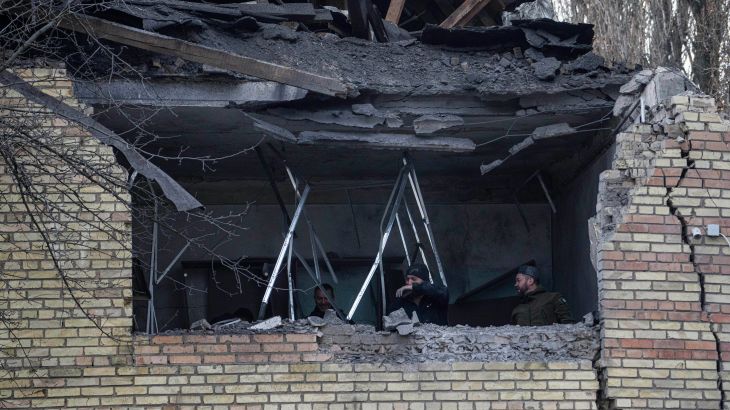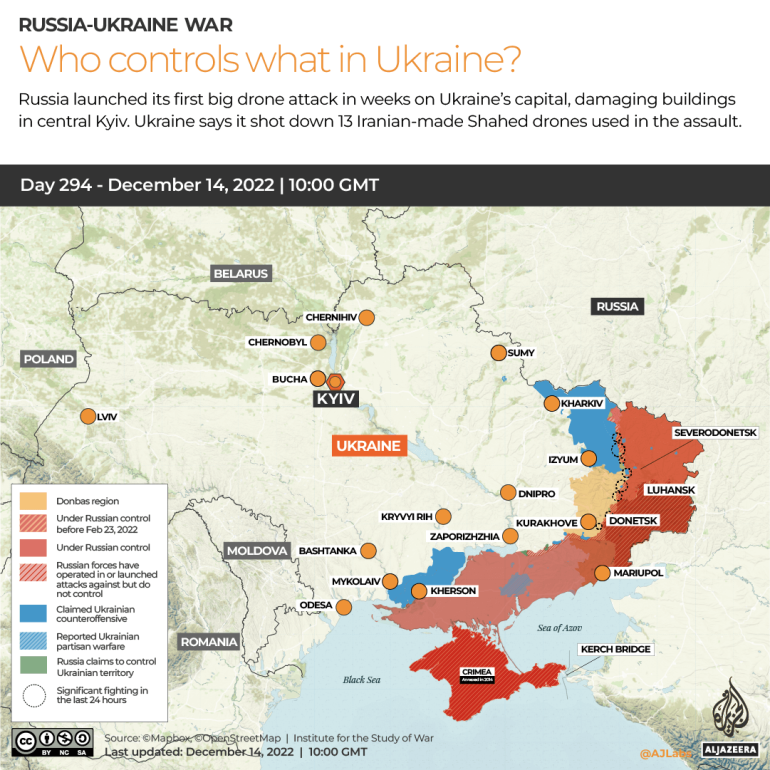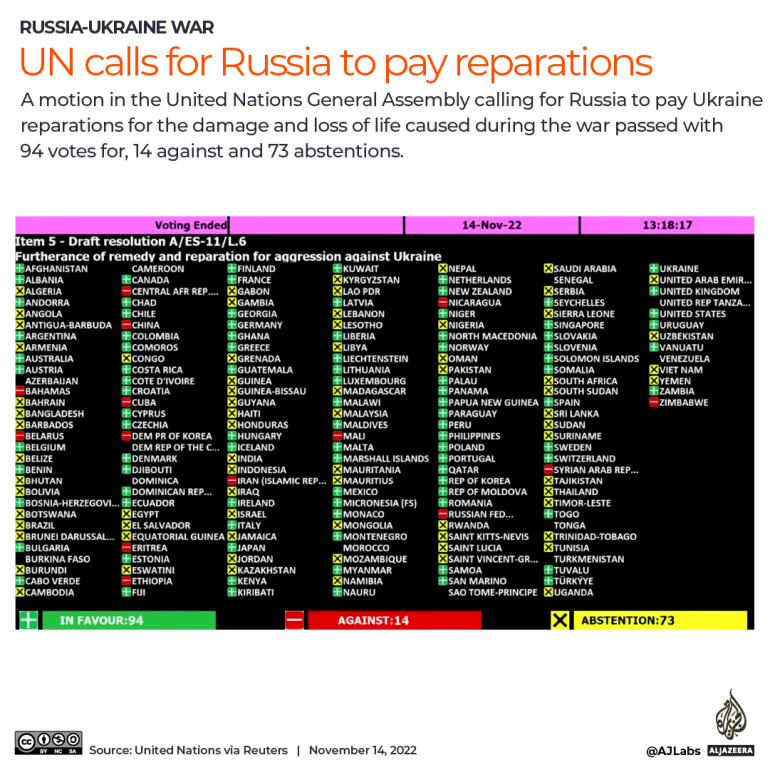Ukraine cherry picks targets as Russia hammers the east
What happened in the 42nd week of Russia’s war in Ukraine?

Throughout the 42nd week of the war, Russian forces shelled the entire line of contact and launched limited ground assaults in the eastern Ukrainian regions of Luhansk and Donetsk.
Russia claimed to be making limited gains, but these, said Ukraine’s general staff, came at a high cost in men and military materials, forcing Russia to delve into aged and unreliable weapons stocks.
Keep reading
list of 4 itemsUS finalising plan to send Patriot air defence system to Ukraine
Explosions heard in Ukrainian capital, emergency teams deployed
A cold and dangerous winter: Russia’s gift to Ukraine
Most of the Russian ground activity was focused on the towns of Bakhmut and Soledar in Donetsk, which encompass nodes of highways that could facilitate further expansion. Some Russian assaults came near Svatove, in Luhansk.
Separatist leader Denis Pushilin, head of the self-proclaimed Donetsk People’s Republic, said Russian forces were advancing in the east.
“We see the advance of our units along the entire line of contact,” he said. “In some areas, this [advance] is 100-200 metres a day, and somewhere 10-20 metres are important if it improves the positions” of the units.
Russia’s defence ministry said on December 11 that offensives in Lyman in the northern Donetsk region had resulted in “more advantageous lines and positions” being taken.
War mappers have estimated that Russia has gained just a few square kilometres on the eastern front in three months.
Meanwhile, Ukraine did not remain on the defensive.
On December 9, said its general staff, 50 wounded Russian mercenaries were brought into Kadiivka hospital in the Luhansk region, evidence that an artillery rocket strike on a Wagner Group base had found its mark.

The following day, the leader of Moscow-backed We Are Together With Russia Movement said two Ukrainian-fired HIMARS rockets had landed in the occupied city of Melitopol in the southern Zaporizhia region, and reported about a dozen explosions resulting from air defences intercepting incoming missiles.
“We’re in the phase of what we would call condition-setting where the Ukrainian general staff is going to continue to go after logistics and command and control, so that in another month or two months, they’ll be able to launch a successful next phase of their counteroffensive,” Major-General Ben Hodges told CNN.
Ukraine’s counteroffensive continues
Ukrainian forces have reclaimed about half the territory Russia seized since its February 24 invasion in two major counteroffensives in the northern Kharkiv and the southern Kherson regions.
Since it received HIMARS rocket launchers from the United States and Germany in late June, Ukraine has consistently targeted Russian ammunition dumps, depriving Russia of its overwhelming firepower.
Russia is now unsealing warehouses of unreliable, 40-year-old ammunition, say Ukrainian sappers who are responsible for defusing thousands of rounds of unexploded ordnance a day.
“We assess that at the rate of fire that Russia has been using its artillery and rocket ammunition in terms of what we would call fully serviceable artillery and rocket ammunition, they could probably do that until early 2023,” a senior US military official told Reuters news agency.
After that, Russia would have to rely on older stocks alone, the source said.
The dusting off of old inventory carried over to missile stocks as well.
Ukraine’s deputy military intelligence chief, General Vadym Skibitskyi, told The New York Times that Ukraine had found the remains of three Kh-55 cruise missiles in the rubble of buildings. Skibitskyi said these had been identified as part of the nuclear arsenal Ukraine returned to Russia in the 1990s in return for security guarantees. Russia had removed their warheads and lobbed them back at Ukraine.
The fly in Ukraine’s ointment is that Russia has, despite sanctions, been able to build about 400 new cruise missiles during the war, according to Ukraine’s military intelligence.
Dmitry Medvedev, the deputy leader of Russia’s Security Council, confirmed that Moscow was stepping up production of its most powerful weapons, without specifying which ones.
Also in the past week, Ukraine’s Western allies have sought to redress the arms asymmetry.
British premier Rishi Sunak promised a tranche of 125 anti-aircraft guns and related ammunition would be delivered to Ukraine in the coming weeks. Sunak promised 50 million pounds ($62m) worth of anti-aircraft guns and ammunition during his first visit to Kyiv on November 19. Earlier in the month, British defence minister Ben Wallace had promised at least 1,000 anti-aircraft missiles.
Swedish Defence Minister Pal Jonson said the next military aid package to Ukraine will be 50 percent larger than the last, and will include air defence equipment. Sweden on November 16 announced a $287m aid package, which was its largest to date. Ukraine has been lobbying for the Swedish Arrow artillery system and Swedish Gripen fighter jets.
The Pentagon announced a $275m drawdown of military aid to Ukraine, including HIMARS rockets, air defences, 80,000 rounds of 155mm howitzer ammunition, Humvees and 150 electric generators. President Joe Biden said the US would prioritise Ukraine’s air defences during a phone call with his Ukrainian counterpart, Volodymyr Zelenskyy.
Zelenskyy said roughly half his country’s defence infrastructure was destroyed.
Russia roasts Germany
Throughout the war, Russia has treated Germany as Europe’s weak link, exploiting its dependence on Russian gas and the political divisiveness of supporting Ukraine.
Russian President Vladimir Putin seized a new opportunity after former Chancellor Angela Merkel told Die Zeit magazine on December 7 that two ceasefire agreements Germany helped broker between Russia and Ukraine in 2014 and 2015 were “an attempt to give Ukraine time to become stronger”.
“It turns out that no one was going to fulfil the Minsk agreements,” Putin said in Bishkek, Uzbekistan, of the ceasefire agreements, named after the Belarusian capital where they were negotiated.
“The leadership of Ukraine, in the words of the former president [Petro Poroshenko], also said that they were not going to sign it, were not going to fulfil it. But I still expected that other participants were sincere with us. It turns out that they also deceived us, and the point was only to pump up Ukraine with weapons and prepare it for hostilities. Apparently, we got our bearings late, to be honest. Maybe we should have started all this earlier,” he said, referring to his February 24 invasion of Ukraine.
A day later, the Russian foreign ministry compared the Maidan protests that overthrew Russophile Ukrainian President Viktor Yanukovych in 2014 with a planned neo-Nazi putsch Germany foiled on December 7.
“The capture of constitutional authorities, which include parliament, courts, territorial and national executive authorities, by ultra-right radicals – is it an attempted coup or not? If so, why did at least three German foreign ministers directly and politically support this when it comes to Ukraine?” wrote foreign ministry spokeswoman Maria Zakharova.
In Russian political parlance, the removal of Yanukovich in 2014 is referred to as a coup.
Doubling down on Berlin, Vyacheslav Volodyn, the speaker of Russia’s parliament, said Germany and France should pay the people of Donetsk and Luhansk reparations, echoing Ukrainian demands for reparations as part of any future ceasefire agreement.
“After Merkel’s recognition, France and Germany bear material and moral responsibility for the situation in Ukraine. They will have to pay compensation to the population of Donbass for eight years of genocide and damage,” Volodyn wrote on his Telegram channel.
German Chancellor Olaf Scholz responded to this barrage, declaring on December 13 that once it ended its war in Ukraine, Russia would need an economic aid package. This may have been intended to remind Russia of Germany’s economic power to help its post-war recovery, but it offended Ukraine supporters.
“Economic deterrence (sanctions) had no impact on Putin’s decision to invade Ukraine. Economic reward is equally unlikely to affect his calculations now,” wrote Minna Ålander, research fellow at the Finnish Institute of International Affairs.